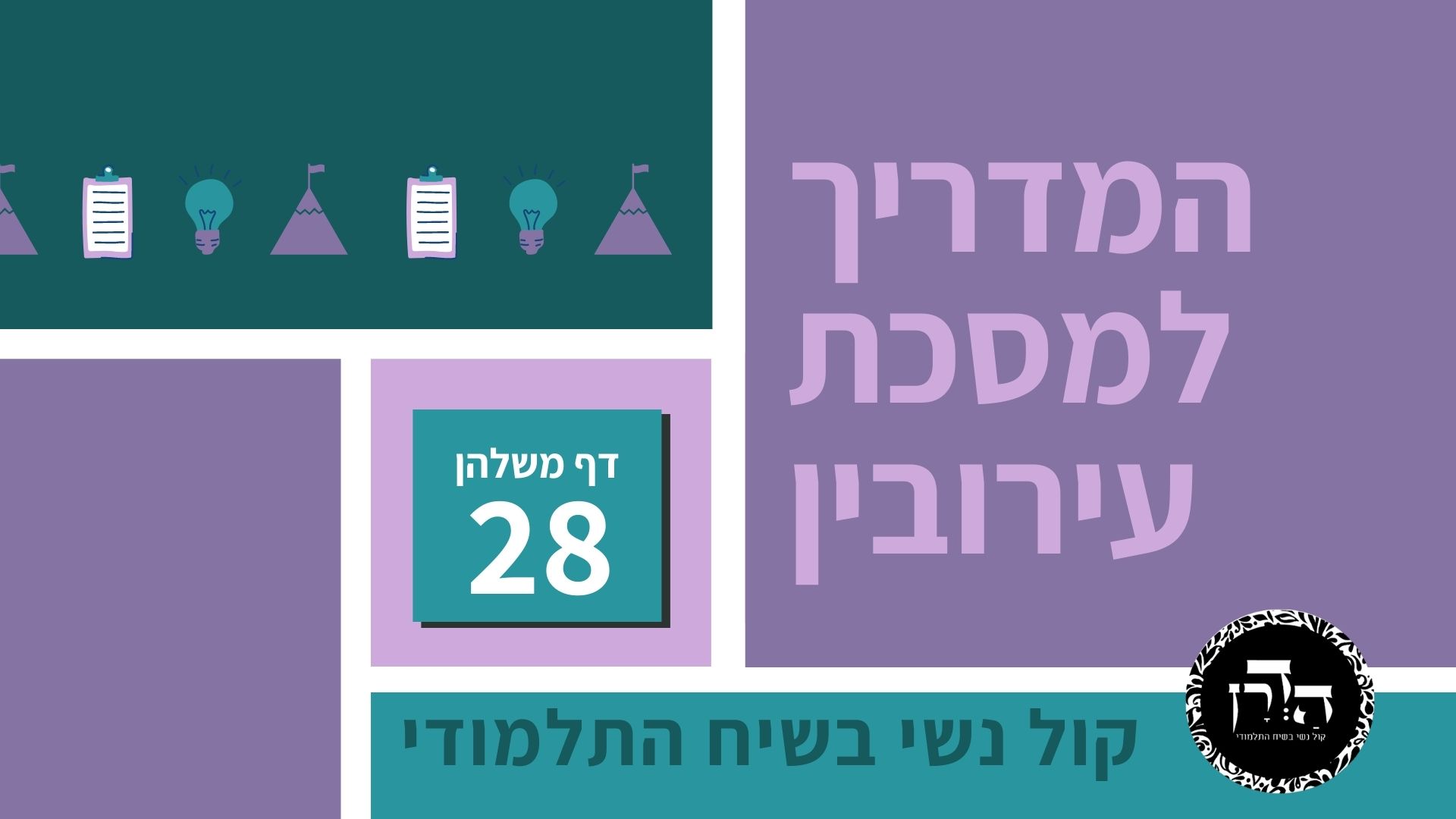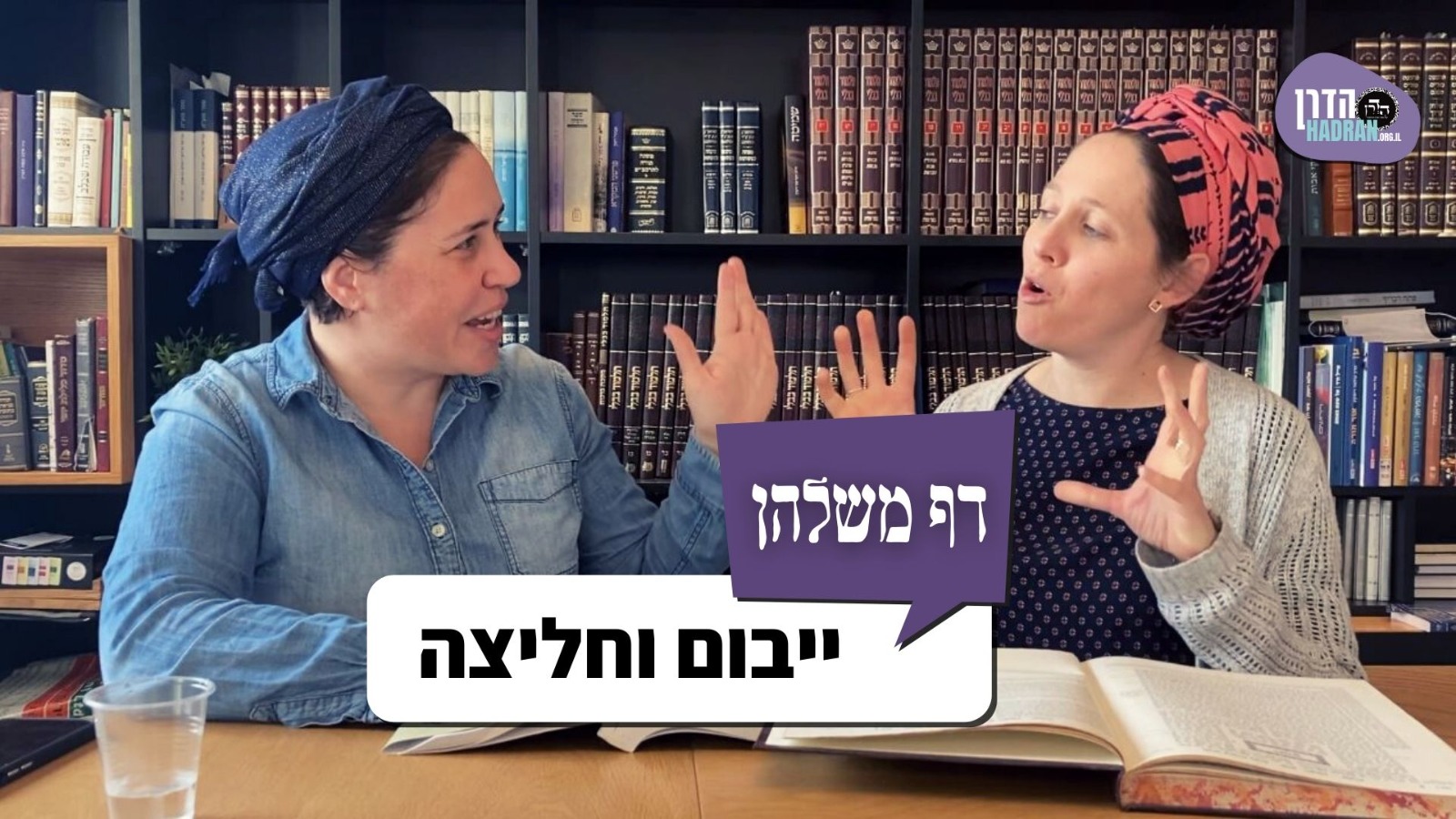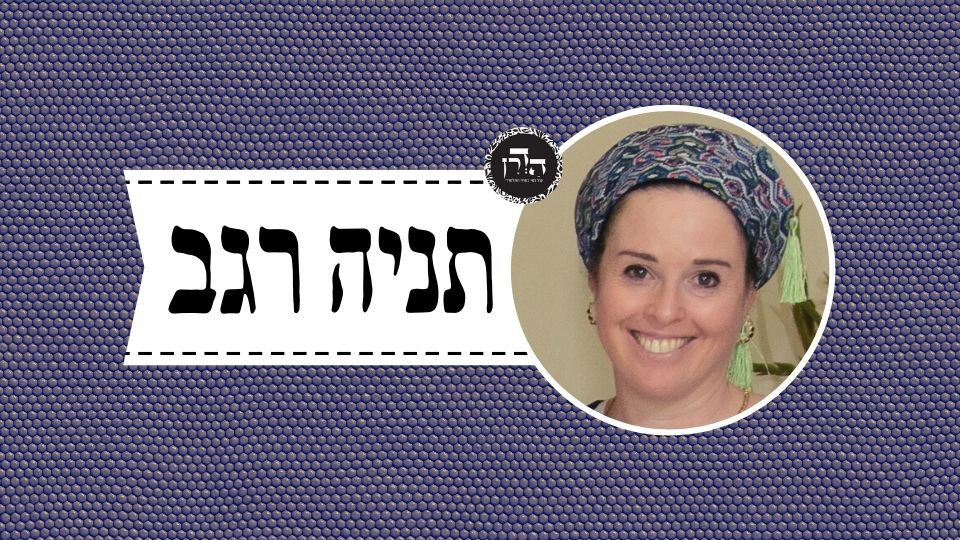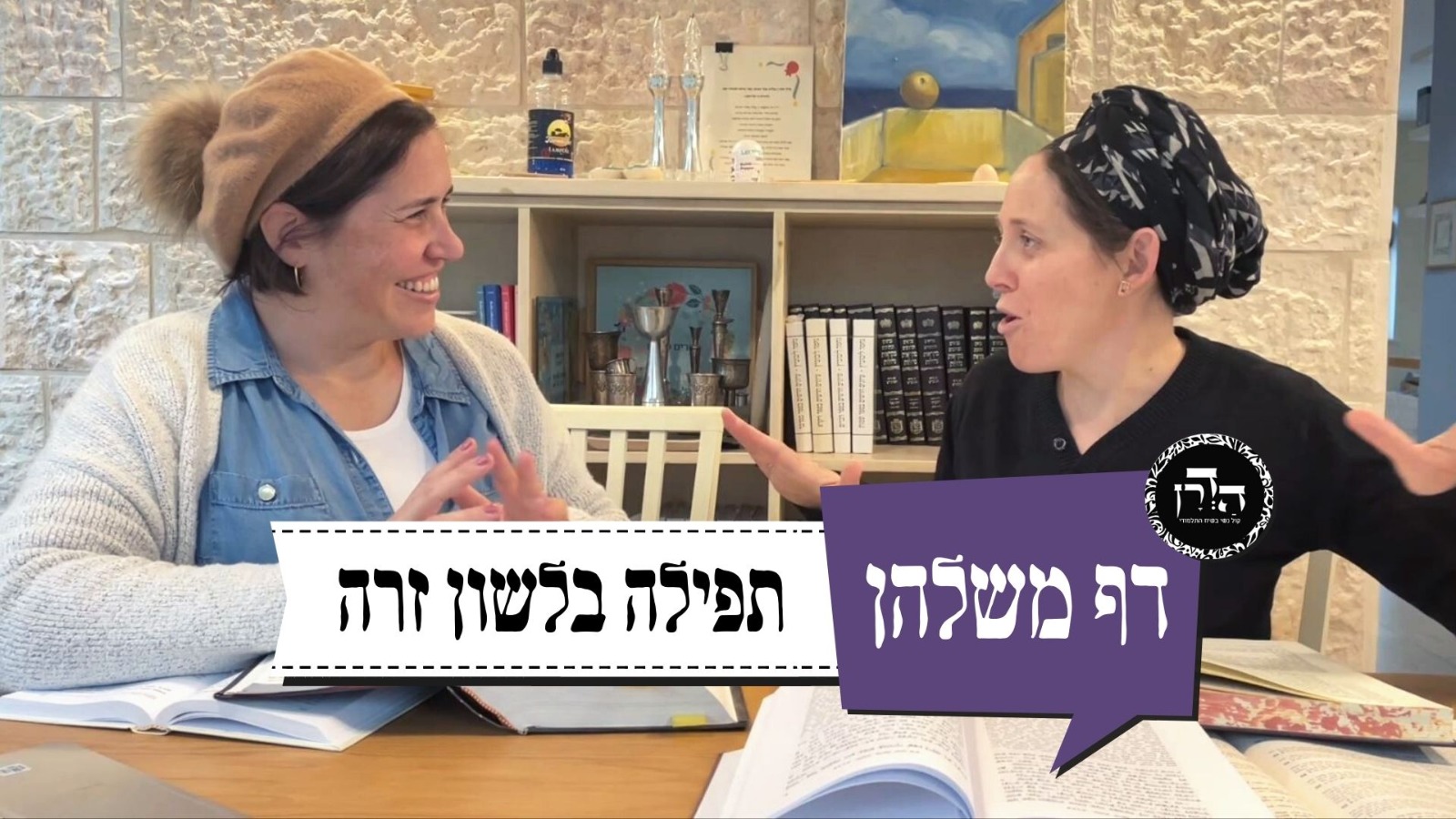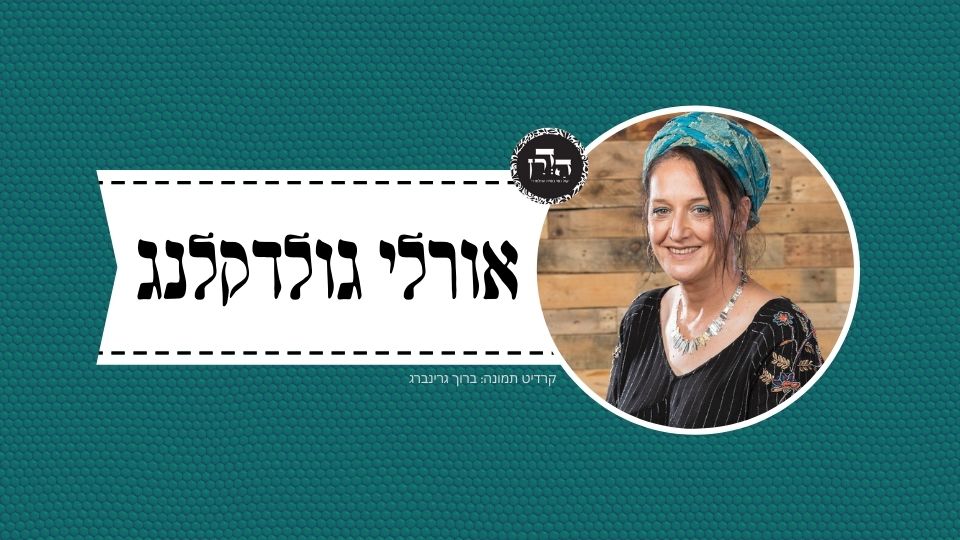הגמרא משווה בין סוגים שונים של דגים. הגמרא מביאה ברייתא שבה מופיע זמן עיבורן של בהמות וחיות שונות. בעקבות זה, מסופר על שיחה בין הקיסר לר’ יהושע בן חנניה שמביא את ר’ יהושע בן חנניה לויכוח עם חכמי אטונה. הם מציגים בפניו שתים עשרה חידות והוא מנצח אותם.
הלימוד השבוע מוקדש לזכות ולשלום הַיְימׇנוֹט אֱמוּנָה בַּת באנצ’י (קָסָאוּ) בת 11 שנעלמה במקום מגוריה בצפת, לפני שנתיים, ביום ט”ז אדר תשפ”ד (25.2.24), ולא נודעו עקבותיה.
הלימוד השבוע מוקדש למען ביטחון המדינה, החיילים והאזרחים, ולמען חירותו של העם האיראני. שנזכה בקרוב שיתקיים בנו הפסוק: "לַיְּהוּדִים הָיְתָה אוֹרָה וְשִׂמְחָה וְשָׂשֹׂן וִיקָר”.
רוצה להקדיש שיעור?

כלים
הלימוד השבוע מוקדש לזכות ולשלום הַיְימׇנוֹט אֱמוּנָה בַּת באנצ’י (קָסָאוּ) בת 11 שנעלמה במקום מגוריה בצפת, לפני שנתיים, ביום ט”ז אדר תשפ”ד (25.2.24), ולא נודעו עקבותיה.
הלימוד השבוע מוקדש למען ביטחון המדינה, החיילים והאזרחים, ולמען חירותו של העם האיראני. שנזכה בקרוב שיתקיים בנו הפסוק: "לַיְּהוּדִים הָיְתָה אוֹרָה וְשִׂמְחָה וְשָׂשֹׂן וִיקָר”.
כלים
העמקה
רוצה להבין מה באמת קורה מתחת לפני השטח של הסוגיה?
שיעורים, פודקאסטים והרחבות של מיטב המורות שלנו יפתחו לך עוד זוויות וכיווני חשיבה.
חדשה בלימוד הגמרא?
זה הדף הראשון שלך? איזו התרגשות עצומה! יש לנו בדיוק את התכנים והכלים שיעזרו לך לעשות את הצעדים הראשונים ללמידה בקצב וברמה שלך, כך תוכלי להרגיש בנוח גם בתוך הסוגיות המורכבות ומאתגרות.
פסיפס הלומדות שלנו
גלי את קהילת הלומדות שלנו, מגוון נשים, רקעים וסיפורים. כולן חלק מתנועה ומסע מרגש ועוצמתי.
בכורות ח
הַדּוֹלְפָנִין פָּרִין וְרָבִין כִּבְנֵי אָדָם. מַאי דּוֹלְפָנִין? אָמַר רַב יְהוּדָה: בְּנֵי יַמָּא.
The dulfanin reproduce like people. The Gemara asks: What are dulfanin? Rav Yehuda says: They are creatures that are called sons of the sea.
כֹּל שֶׁבֵּיצָיו מִבַּחוּץ — מוֹלִיד, וְכֹל שֶׁבִּפְנִים — מֵטִיל בֵּיצִים.
The baraita continues: In the case of any male animal whose testicles are external, the female gives birth to live offspring, and in the case of any male animal whose testicles are internal, the female lays eggs.
אִינִי? וְהָאָמַר שְׁמוּאֵל: אֲוָוז וַאֲוָוז בָּר כִּלְאַיִם זֶה בָּזֶה, וְהָוֵינַן בָּהּ: מַאי טַעְמָא? אָמַר אַבָּיֵי: זֶה בֵּיצָיו מִבַּחוּץ, וְזֶה בֵּיצָיו מִבִּפְנִים, וְתַרְוַיְיהוּ מְטִילֵי בֵּיצִים!
The Gemara asks: Is that so? But doesn’t Shmuel say that a domestic goose and a wild goose are considered diverse kinds, and one may not mate them with each other. And we discussed it: What is the reason? Abaye said: In the case of this one, the male wild goose, its testicles are external, and in the case of that one, the domestic goose, its testicles are internal. The Gemara comments: And yet both geese lay eggs. Evidently, the fact that the male’s testicles are external does not prove that the female gives birth.
אֶלָּא, כֹּל שֶׁזַּכְרוּתוֹ מִבַּחוּץ — מוֹלִיד, מִבִּפְנִים — מֵטִיל בֵּיצִים.
Rather, the baraita must mean the following: With regard to any animal whose male reproductive organ is external, the female gives birth, and in the case of any male animal whose reproductive organ is internal, the female lays eggs. Although the testicles of the male wild goose are external, its reproductive organ is internal.
כֹּל שֶׁתַּשְׁמִישׁוֹ בַּיּוֹם — יוֹלֵד בַּיּוֹם, בַּלַּיְלָה — יוֹלֵד בַּלַּיְלָה, כֹּל שֶׁתַּשְׁמִישׁוֹ בֵּין בַּיּוֹם בֵּין בַּלַּיְלָה — יוֹלֵד בֵּין בַּיּוֹם בֵּין בַּלַּיְלָה.
§ The baraita continues to discuss matters of animal procreation: Any species whose sexual intercourse occurs only during the daytime gives birth only during the daytime; any species whose intercourse occurs only at night gives birth only at night; any species whose intercourse occurs both during the daytime and at night gives birth both during the daytime and at night.
תַּשְׁמִישׁוֹ בַּיּוֹם יוֹלֵד בַּיּוֹם — תַּרְנְגוֹל, בַּלַּיְלָה יוֹלֵד בַּלַּיְלָה — עֲטַלֵּף, תַּשְׁמִישׁוֹ בֵּין בַּיּוֹם בֵּין בַּלַּיְלָה יוֹלֵד בֵּין בַּיּוֹם בֵּין בַּלַּיְלָה — אָדָם וְכֹל דְּדָמֵי לֵיהּ.
The Gemara elaborates: The statement that any species whose intercourse occurs during the daytime gives birth during the daytime is referring to a chicken. The statement that any species whose intercourse occurs at night gives birth at night is referring to a bat. The statement that any species whose intercourse occurs both during the daytime and at night gives birth both during the daytime and at night is referring to a human and any creature that is similar to him.
לְמַאי נָפְקָא מִינַּהּ? לְכִדְרַב מָרִי בְּרֵיהּ דְּרַב כָּהֲנָא, דְּאָמַר רַב מָרִי בְּרֵיהּ דְּרַב כָּהֲנָא: בָּדַק בְּקִינָּה שֶׁל תַּרְנְגוֹלִין מֵעֶרֶב יוֹם טוֹב וְלֹא מָצָא בָּהּ בֵּיצָה, וּלְמָחָר הִשְׁכִּים וּמָצָא בָהּ בֵּיצָה — מוּתֶּרֶת בַּאֲכִילָה בְּיוֹם טוֹב, אֵימַר: לֹא בָּדַק יָפֶה.
The Gemara asks: What halakhic difference is there whether an animal gives birth during the daytime or at night? The Gemara answers: The difference is with regard to that which Rav Mari, son of Rav Kahana, said. As Rav Mari, son of Rav Kahana, said: If one examined a chicken’s nest on a Festival eve and did not find an egg in it, and the following day, on the Festival, he rose early, before dawn, and found an egg in it, consumption of the egg is permitted on the Festival. It is not considered an egg that was laid on the Festival, which is forbidden (see Beitza 2a), as chickens do not lay eggs at night. Although he examined the nest before the Festival and failed to find an egg there, one is compelled to say that he did not examine the nest carefully.
וַהֲלֹא בָּדַק יָפֶה! אֵימַר: יָצְתָה רוּבָּהּ וְחָזְרָה הֲוָה, וְכִדְרַבִּי יוֹחָנָן, דְּאָמַר רַבִּי יוֹחָנָן: בֵּיצָה שֶׁיָּצְתָה רוּבָּהּ מֵעֶרֶב יוֹם טוֹב וְחוֹזֶרֶת — מְוֻתֶּרֶת לְאוֹכְלָהּ בְּיוֹם טוֹב.
The Gemara challenges: But he did examine the nest carefully, as the baraita states that he examined it. The Gemara explains: One must say that this was a case where most of the egg emerged on the eve of the Festival and returned inside its mother before the examination. And this ruling is in accordance with the opinion of Rabbi Yoḥanan, as Rabbi Yoḥanan says: In a case where most of the egg emerged on the eve of the Festival and returned inside its mother it is permitted to eat it on the Festival, as once most of it emerged it is considered to have been laid already.
כֹּל שֶׁתַּשְׁמִישׁוֹ וְעִיבּוּרוֹ שָׁוֶה — יוֹלְדִים וּמְגַדְּלִים זֶה מִזֶּה. הַכֹּל מְשַׁמְּשִׁין פָּנִים כְּנֶגֶד עוֹרֶף, חוּץ מִשְּׁלֹשָׁה שֶׁמְּשַׁמְּשִׁין פָּנִים כְּנֶגֶד פָּנִים, וְאֵלּוּ הֵן: דָּג, וְאָדָם, וְנָחָשׁ.
§ The baraita continues: Any two animals of different species whose manner of intercourse and time of gestation are identical can have offspring together and can raise, i.e., nurse, the young of each other. With regard to the manner of intercourse, all species engage in intercourse with the face of the male opposite the back of the neck of the female, meaning that the male comes from behind the female, except for three species that engage in intercourse face-to-face, and they are these: Fish, and humans, and the snake.
וּמַאי שְׁנָא הָנֵי תְּלָתָא? כִּי אֲתָא רַב דִּימִי אָמְרִי בְּמַעְרְבָא: הוֹאִיל וְדִיבְּרָה עִמָּהֶם שְׁכִינָה.
The Gemara asks: And what is different about these three? When Rav Dimi came from Eretz Yisrael to Babylonia he reported that they say in the West, Eretz Yisrael, the following explanation: They are different because the Divine Presence spoke with them. This occurred when the fish swallowed the prophet Jonah (see Jonah 2:11), when Adam and other prophets were spoken to by God, and when the snake caused Adam and Eve to sin (see Genesis 3:14).
תָּנָא: גָּמָל — אָחוֹר כְּנֶגֶד אָחוֹר.
A tanna taught: A camel engages in intercourse back to back with its mate.
תָּנוּ רַבָּנַן: תַּרְנְגוֹלֶת — לְעֶשְׂרִים וְאֶחָד יוֹם, וּכְנֶגְדָּהּ בָּאִילָן — לוּז, כֶּלֶב — לַחֲמִשִּׁים יוֹם, וּכְנֶגְדּוֹ בָּאִילָן — תְּאֵינָה, חָתוּל — לַחֲמִשִּׁים וּשְׁנַיִם יוֹם, וּכְנֶגְדּוֹ בָּאִילָן — תּוּת, חֲזִיר — לְשִׁשִּׁים יוֹם, כְּנֶגְדּוֹ בָּאִילָן — תַּפּוּחַ, שׁוּעָל וְכׇל מִינֵי שְׁרָצִים — שִׁשָּׁה חֳדָשִׁים, וּכְנֶגְדָּם בָּאִילָן — תְּבוּאָה.
§ The Gemara cites a baraita that discusses the length of gestation for various animals. The Sages taught that a chicken hatches after twenty-one days, and corresponding to it in length of gestation with regard to trees is the almond, which ripens twenty-one days after the budding of the flower. A dog gives birth after fifty days, and corresponding to it with regard to trees is the fig. A cat gives birth after fifty-two days, and corresponding to it with regard to trees is the mulberry. A pig gives birth after sixty days, and corresponding to it with regard to trees is the apple. A fox and all types of creeping animals give birth after six months, and corresponding to them with regard to trees, i.e., plants, is grain.
בְּהֵמָה דַּקָּה טְהוֹרָה — לַחֲמִשָּׁה חֳדָשִׁים, וּכְנֶגְדָּן בָּאִילָן — גֶּפֶן. בְּהֵמָה גַּסָּה טְמֵאָה — לִשְׁנֵים עָשָׂר חוֹדֶשׁ, וּכְנֶגְדּוֹ בָּאִילָן — דֶּקֶל. טְהוֹרָה — לְתִשְׁעָה חֳדָשִׁים, וּכְנֶגְדָּהּ בָּאִילָן — זַיִת. הַזְּאֵב וְהָאֲרִי וְהַדּוֹב וְהַנָּמֵר וְהַבַּרְדְּלָס וְהַפִּיל וְהַקּוֹף וְהַקִּיפוֹף — לְשָׁלֹשׁ שָׁנִים, וּכְנֶגְדָּן בָּאִילָן — בְּנוֹת שׁוּחַ.
Small kosher livestock, such as sheep or goats, give birth after five months, and corresponding to them with regard to trees is the grapevine. Large non-kosher livestock, such as camels or donkeys, give birth after twelve months, and corresponding to them with regard to trees is the date palm. Large kosher livestock, such as cows, give birth after nine months, and corresponding to them with regard to trees is the olive. The wolf, and the lion, and the bear, and the leopard, and the bardelas, and the elephant, and the monkey, and the long-tailed ape give birth after three years, and corresponding to them with regard to trees is the white fig.
אֶפְעֶה לְשִׁבְעִים שָׁנָה, וּכְנֶגְדּוֹ בָּאִילָן — חָרוּב. חָרוּב זֶה, מִשְּׁעַת נְטִיעָתוֹ עַד שְׁעַת גְּמַר פֵּירוֹתָיו — שִׁבְעִים שָׁנָה, וִימֵי עִיבּוּרוֹ שָׁלֹשׁ שָׁנִים. נָחָשׁ לְשֶׁבַע שָׁנִים, וּלְאוֹתוֹ רָשָׁע לֹא מָצִינוּ חָבֵר. וְיֵשׁ אוֹמְרִים: מוֹכְסָסִים.
The baraita continues: A viper gives birth after seventy years, and corresponding to it with regard to trees is the carob. In the case of this carob, the period from the time of its planting until the time of the ripening of its fruit is seventy years, and the length of its gestation is three years. A snake is born after seven years, and for that wicked animal we have not found a counterpart among trees. And some say that mukhsasim are the equivalent, as they ripen after seven years.
מְנָא הָנֵי מִילֵּי? אָמַר רַב יְהוּדָה אָמַר רַב, וּמָטוּ בָּהּ מִשּׁוּם דְּרַבִּי יְהוֹשֻׁעַ בֶּן חֲנַנְיָא, שֶׁנֶּאֱמַר: ״אָרוּר אַתָּה מִכׇּל הַבְּהֵמָה וּמִכֹּל חַיַּת הַשָּׂדֶה״. אִם מִבְּהֵמָה נִתְקַלְּלָה, מֵחַיָּה לֹא כׇּל שֶׁכֵּן?
The Gemara asks: From where is this matter, that the gestation period of a snake is seven years, derived? Rav Yehuda says that Rav says, and some determined it to be in the name of Rabbi Yehoshua ben Ḥananya: It is derived from that which is stated with regard to the punishment of the snake for causing Adam and Eve to sin: “Cursed are you from among all animals, and from among all beasts of the field” (Genesis 3:14), in that your gestation period should be longer than all of them. Now, why does the verse mention the beasts of the field, i.e., undomesticated animals? If the snake was cursed more than the domesticated animals, then all the more so is it not clear that it was cursed more than the undomesticated animals? The shortest gestation period of domesticated animals, which is five months for a goat, is longer than the shortest gestation period among undomesticated animals, which is fifty-two days for a cat.
אֶלָּא, לוֹמַר לָךְ: כְּשֵׁם שֶׁנִּתְקַלְּלָה הַבְּהֵמָה מֵחַיָּה, אֶחָד לְשִׁבְעָה, וּמַאי נִיהוּ? חֲמוֹר מֵחָתוּל, כָּךְ נִתְקַלֵּל הוּא מִבְּהֵמָה, אַחַת לְשֶׁבַע, דְּהָוֵה לֵיהּ שַׁב שְׁנֵי.
Rather, the verse mentions the beasts of the field to tell you: Just as the domesticated animals were cursed more than the undomesticated animals by a proportion of one to seven; the Gemara interjects: And with regard to what case is that? It is with regard to a donkey, whose gestation period as mentioned is twelve months, compared to a cat, whose gestation period is fifty-two days. Seven times longer than fifty-two days is 364 days, which means that the gestation period of the donkey, which is one year, is almost exactly seven times longer than that of the cat. Rav Yehuda continues: So too, the snake was cursed more than domesticated animals, i.e., the donkey, in a proportion of one to seven, which is a total of seven years.
אֵימָא: כְּשֵׁם שֶׁנִּתְקַלְּלָה חַיָּה מִבְּהֵמָה, אַחַת לְשָׁלֹשׁ שָׁנִים, וּמַאי נִיהוּ? אֲרִי מֵחֲמוֹר, כָּךְ נִתְקַלֵּל הוּא מֵחַיָּה אַחַת לְשָׁלֹשׁ שָׁנִים, דְּהָוֵה לֵיהּ תֵּשַׁע שָׁנִים.
The Gemara challenges: Say that the verse can be interpreted as follows: Just as the undomesticated animals were cursed more than the domesticated animals by a measure of one year to three years; the Gemara interjects: And in what case is that? It is in the case of a lion, whose gestation period is three years, compared to a donkey, whose gestation period is one year. The Gemara continues its challenge: So too, the snake was cursed more than the undomesticated animals, i.e., the lion, by a proportion of one year to three years, which is nine years.
מִי כְּתִיב ״מִכׇּל הַחַיָּה וּמִכׇּל הַבְּהֵמָה״? ״מִכׇּל הַבְּהֵמָה וּמִכֹּל הַחַיָּה״ כְּתִיב! אָרוּר הוּא מִבְּהֵמָה שֶׁנִּתְקַלְּלָה מֵחַיָּה.
The Gemara responds: Is it written: Cursed are you from among all beasts, and from among all animals? No, it is written: “From among all animals, and from among all beasts,” meaning that it is cursed from among the domesticated animals, which were cursed from among the undomesticated animals.
וְאֵימָא: כְּשֵׁם שֶׁנִּתְקַלְּלָה בְּהֵמָה מֵחַיָּה אֶחָד לְשָׁלֹשׁ, וּמַאי נִיהוּ? עֵז מֵחָתוּל, כָּךְ נִתְקַלֵּל הוּא מִבְּהֵמָה אֶחָד לְשָׁלֹשׁ, דְּהָוֵה לֵיהּ חֲמֵיסַר יַרְחֵי!
The Gemara challenges: Why must it mean that the snake was cursed more than the donkey in the same proportion that the donkey was cursed more than the cat? But say instead that just as the domesticated animals were cursed more than the undomesticated animals by a measure of one to three; the Gemara interjects: And in what case is that? It is in the case of a goat, whose gestation period is five months, compared to a cat, whose gestation period is fifty-two days. The Gemara continues its challenge: So too, the snake was cursed more than the domesticated animals, i.e., the goat, by a proportion of one to three, which is fifteen months.
אִיבָּעֵית אֵימָא: ״מִכׇּל הַבְּהֵמָה״ כְּתִיב. אִי בָּעֵית אֵימָא: קְלָלָה הוּא, קְלָלָה שְׁדִי עִילָּוֵיהּ.
The Gemara answers: If you wish, say that it is written: “Cursed are you from among all animals,” including the most accursed of them, i.e., the donkey. If you wish, say instead that since it is a curse that the snake received here, the verse imposes upon it the most extreme curse that can be derived from the text.
אֲמַר לֵיהּ קֵיסָר לְרַבִּי יְהוֹשֻׁעַ בֶּן חֲנַנְיָה: נָחָשׁ לְכַמָּה מִיעַבַּר וּמוֹלֵיד? אֲמַר לֵיהּ: לְשַׁב שְׁנֵי. וְהָא סָבֵי דְּבֵי אַתּוּנָא אַרְבְּעִינְהוּ, וְאוֹלִיד לִתְלָת! הָנְהוּ מִיעַבְּרִי הֲווֹ מֵעִיקָּרָא אַרְבַּע. וְהָא קָמְשַׁמְּשִׁי שַׁמּוֹשֵׁי! אִינְהוּ נָמֵי מְשַׁמְּשִׁי כְּאָדָם.
§ With regard to the gestation time of a snake, the Gemara relates that the Roman emperor said to Rabbi Yehoshua ben Ḥananya: In the case of a snake, after how long a period of gestation does it give birth? Rabbi Yehoshua ben Ḥananya said to him: After seven years. The emperor said to him: But the elders, i.e., the sages, of the school of Athens bred snakes and they gave birth after three years. Rabbi Yehoshua ben Ḥananya responded: Those snakes were already pregnant from beforehand for four years. The emperor asked: But they engaged in intercourse, and animals do so only in order to give birth, not when they are already pregnant. Rabbi Yehoshua responded: Snakes also engage in intercourse like people, i.e., they do not do so solely for reproduction.
וְהָא חַכִּימֵי אִינְהוּ? אֲנַן חֲכִימִינַן מִינַּיְיהוּ. אִי חֲכִימַתְּ, זִיל זַכִּינְהוּ וְאַיְתִינְהוּ לִי! אֲמַר לֵיהּ: כַּמָּה הָווּ? שִׁיתִּין גַּבְרֵי.
The emperor said to him: But how can you disagree with the sages of Athens? Aren’t they wise? Rabbi Yehoshua ben Ḥananya responded: We are wiser than they. The emperor said: If you are wiser than they, then go defeat them in debate and bring them to me. Rabbi Yehoshua said to him: How many are there? The emperor answered: Sixty men.
אֲמַר לֵיהּ: עֲבֵיד לִי סְפִינְתָּא דְּאִית בַּהּ שִׁיתִּין בָּתֵּי, וְכֹל בֵּיתָא אִית בַּהּ שִׁיתִּין בִּיסְתַּרְקֵי. עֲבַד לֵיהּ. כִּי מְטָא לְהָתָם לְבֵי טַבָּחָא, אַשְׁכְּחֵיהּ לְהָהוּא גַּבְרָא דְּקָא פָשֵׁיט חֵיוְתָא. אֲמַר לֵיהּ: רֵישָׁךְ לְזַבּוֹנֵי? אֲמַר לֵיהּ: אִין. אֲמַר לֵיהּ: בְּכַמָּה? אֲמַר לֵיהּ: בְּפַלְגָא דְּזוּזָא. יְהַב לֵיהּ.
Rabbi Yehoshua ben Ḥananya said to him: Construct a ship that has sixty rooms for me, and each room should have sixty mattresses [bistarkei] in it. The emperor constructed it for him. Rabbi Yehoshua then set out on the ship for Athens. When he arrived there, he entered a butcher shop and found a certain man, the butcher, flaying an animal. Rabbi Yehoshua said to him: Is your head for sale? The butcher said to him: Yes it is. Rabbi Yehoshua said to him: For how much is it being sold? The butcher said to him: For half a dinar. Rabbi Yehoshua gave him the money.
לְסוֹף, אֲמַר לֵיהּ: אֲנָא רֵישָׁא דְּחֵיוְתָא אֲמַרִי לָךְ? אֲמַר לֵיהּ: אִי בָּעֵית דְּאֶשְׁבְּקָךְ סַגִּי אַחְוִי לִי פִּיתְחָא דְּבֵי אַתּוּנָא. אֲמַר לֵיהּ: מִסְתְּפֵינָא דְּכֹל דְּמַחְוֵי קָטְלִי לֵיהּ. אֲמַר לֵיהּ: דְּרִי כְּרִיכָא דִּקְנֵיא, וְכִי מָטֵית לְהָתָם זִקְפֵהּ כְּמַאן דְּקָא מִתְּפַח.
After Rabbi Yehoshua paid the butcher, he said to him: Did I say to you that I wanted the head of the animal? I was referring to your head, and you must now keep your word and give me your head. Rabbi Yehoshua said to him: If you wish for me to let you be, go and show me the entrance to the school of the sages of Athens. The butcher said to him: I am afraid, as they kill anyone who shows its location to another. Rabbi Yehoshua said to him: Carry a bundle of reeds, and when you arrive there, stand it up like one who is resting, to mark the location. The butcher did this, and Rabbi Yehoshua successfully found the entrance.
אַשְׁכַּח דַּרְבְּנָאֵי מִגַּוַּאי וְדַרְבְּנָאֵי מִבָּרַאי, דְּאִי חָזוּ כַּרְעָא דְּעָיְילָא — קָטְלִי לְהוּ לְבָרַאי, וּדְנָפְקָא — קָטְלִי לְהוּ לְגַוַּאי.
Rabbi Yehoshua found guards stationed on the inside and guards stationed on the outside to ensure that no one could enter or exit. They also spread sand on the ground in the entranceway so that they could detect if anyone entered or left. If they saw footsteps that were entering they would kill the outer guards for allowing people to enter, and if they saw footsteps that were exiting they would kill the inner guards for allowing people to leave.
אַפְכֵהּ לְסַנְדָּלֵיהּ — קָטְלִי לְהוּ לְגַוָּאֵי, אַפְכֵהּ לְסַנְדָּלֵיהּ — קָטְלִי לְהוּ לְכוּלְּהוּ.
Rabbi Yehoshua reversed his sandal so it was facing away from the entrance, walked on the sand, and snuck away, thereby creating the appearance of someone who had left the building. When the authorities saw the footsteps, they killed the inner guards. Rabbi Yehoshua then returned, reversed his sandal, and made footsteps in the sand indicating that someone had entered the building. They then killed all the guards, including the outer ones, and Rabbi Yehoshua succeeded in entering the building.
אַשְׁכַּח יָנוֹקֵי מִלְּעֵיל, סָבֵי מִלְּתַחַת. אֲמַר: אִי יָהֵיבְנָא שְׁלָמָא לְהָנֵי, קָטְלִי לִי הָנֵי, סָבְרִי: אֲנַן עֲדִיפִינַן, דַּאֲנַן קַשִּׁינַן טְפֵי וְאִינְהוּ דַּרְדַּקֵּי.
Rabbi Yehoshua found the younger sages sitting in the upper, more prominent section, and the elder ones in the lower section. He said to himself: I must first greet the younger sages, as they are sitting in the upper section, prior to the elder sages; but if I greet these younger sages first, those elder sages will kill me, as they maintain: We are better, because we are older and they are children.
אֲמַר: שְׁלָמָא לְכוּ. אֲמַרוּ לֵיהּ: מַאי עֲבִידְתָּיךְ? אֲמַר לְהוּ: אֲנָא חַכִּימָא דִיהוּדָאֵי אֲנָא, בָּעֵינָא לְמִיגְמַר חֻכְמְתָא מִינַּיְיכוּ. אִי הָכִי, נִיבְעֵי לָךְ! אֲמַר לְהוּ: לְחַיֵּי, אִי זָכֵיתוּ — כֹּל דְּבָעֵיתוּ עֲבִידוּ בִּי, וְאִי זָכֵינָא בְּכוּ — אִיכְלוּ גַּבַּאי בִּסְפִינְתָּא.
Rabbi Yehoshua said: Greetings to you, but did not directly address either group. They said to him: What are you doing here? Rabbi Yehoshua said to them: I am a Sage of the Jews, and I desire to learn wisdom from you. They said to him: If so, we will ask you questions and see if you are worthy of this privilege. Rabbi Yehoshua said to them: Very well. If you win, you may do to me anything you wish, and if I defeat you, then eat with me on my ship.
אֲמַרוּ לֵיהּ: הַהוּא גַּבְרָא דְּאָזֵיל וּבָעֵי אִתְּתָא וְלָא יָהֲבוּ לֵיהּ, מַאי חֲזֵי לֵיהּ דְּאָזֵיל הֵיכָא דְּמִדְּלוּ מִינָּיהּ? שְׁקַל סִיכְּתָא, דָּצַהּ לְתַתַּאי — לָא עָאל, לְעִילַּאי — עָאל. אֲמַר: הַאי נָמֵי מִיתְרְמֵי בַּת מַזָּלֵיהּ.
The sages of Athens said to him: In the case of a certain man who goes and asks to marry a woman and her family does not give her to him, why would he see fit to go to a family that is greater than the first? Rabbi Yehoshua took a peg and stuck it into the lower part of the wall, but it did not go in. He then stuck it into the upper portion of the wall where there was a hole, and it went in. He said to them: In this case too, where he goes to a more distinguished family than the first, perhaps he will find the girl destined for him.
גַּבְרָא דְּאוֹזֵיף וְטָרֵיף, מַאי חֲזָא דַּהֲדַר אוֹזֵיף? אֲמַר לְהוּ: גַּבְרָא אֲזַל לְאַגְמָא, קְטַל קַמָּא טוּנָא וְלָא מָצֵי בֵּיהּ, קָטֵיל וּמַנַּח עִילָּוֵיהּ, עַד (דְּאִיתְרְמִי) [דְּמִיתְרְמֵי] אִינִישׁ מַדְלֵי לֵיהּ.
The sages of Athens asked him another question: In the case of a man who lends money to an individual and the borrower does not repay the loan, and the lender repossesses the borrower’s property as payment instead, why would he see fit to lend to others again? Rabbi Yehoshua said to them: This is what people do: If a man goes to the pond, initially cuts a bundle of reeds, but finds that he cannot lift it, he does not stop cutting wood. Instead, he cuts more wood and places it upon the first, until a person happens to pass by and helps him raise it upon his shoulders, so that he can carry it home. So too, a person continues to lend based on the assumption that he will eventually find an appropriate borrower.
אֲמַרוּ לֵיהּ: אֵימָא לַן מִילֵּי דִּבְדִיאִי! אֲמַר לְהוּ: הֲוָה הַהִוא כּוּדַנְיְתָא דִּילִידָא, וַהֲוָה תְּלֵי לֵיהּ פִּיתְקָא, וּכְתַב בֵּיהּ דְּמַסֵּיק בְּבֵי אַבָּא מְאָה אַלְפָּא זוּזֵי. אֲמַרוּ לֵיהּ: וְכוּדַנְיְתָא מִי יָלְדָה? אֲמַר לְהוּ: (הֵי נִיהוּ) [הָנֵי נִינְהוּ] מִילֵּי דִבְדִיאִי.
The sages of Athens said to him: Say to us a matter of nonsense. Rabbi Yehoshua said to them: There was a certain mule that gave birth, and a note was hanging on the newborn mule’s neck and on it was written that it is owed 100,000 dinars by its father’s household. They said to him: But can a mule give birth? Rabbi Yehoshua said to them: This is why it is a matter of nonsense, as it is impossible for a mule to give birth.
מִילְחָא כִּי סָרְיָא, בְּמַאי מָלְחִי לַהּ? אֲמַר לְהוּ: בְּסִילְתָּא דְכוּדַנְיְתָא. וּמִי אִיכָּא סִילְתָּא לְכוּדַנְתָּא? וּמִילְחָא מִי סְרֵי?
The sages of Athens then asked another question: When salt is spoiling, with what does one salt it to preserve it? Rabbi Yehoshua said to them: With the placenta of a mule. They said to him: But is there a placenta of a mule? Rabbi Yehoshua said to them: And does salt spoil?
בְּנִי לַן בֵּיתָא בַּאֲוִירָא דְּעָלְמָא! אָמַר שֵׁם, תְּלָא בֵּין רְקִיעָא לְאַרְעָא. אֲמַר לְהוּ: אַסִּיקוּ לִי לִיבְנֵי וְטִינָא. מְצִיעֲתֵיהּ דְּעָלְמָא הֵיכָא? זַקְפַהּ לְאֶצְבַּעְתֵּיהּ, אֲמַר לְהוּ: הָכָא. אֲמַרוּ לֵיהּ: וּמִי יֵימַר? אַיְיתוֹ אַשְׁלֵי וּמְשַׁחוּ.
They said to him: Build us a house in the air of the world. Rabbi Yehoshua uttered a Name of God and hovered between the sky and the earth. He said to them: Bring up to me bricks and mortar and I will build you a house here. They asked him: Where is the center of the world? Rabbi Yehoshua raised his finger and said to them: Here. They said to him: And who says that you are correct? He said to them: Bring ropes and measure.
אִית לַן בֵּירָא בְּדַבְרָא, עַיְילֵאּ לְמָתָא! אֲמַר לְהוּ: אַפְשִׁילוּ לִי חַבְלֵי מִפָּארֵי וַאֲעַיְּילֵיהּ. אִית לַן רִיחְיָא דִּתְבִירָא, חַיְּיטַיהּ. אֲמַר: כְּרוּכוּ לִי מִינַּיהּ גַּרְדֵי וְאִיחַיְּיטַיהּ.
They said to him: We have a pit in the field; bring it to the city. Rabbi Yehoshua said to them: Braid ropes made of bran for me and I will bring it to the city with them. They then said to him: We have a mill that broke; sew it back together. Rabbi Yehoshua said to them: Pull out threads from the mill for me and I will sew them together.
מְשָׁרָא דְּסַכִּינֵי בְּמַאי קָטְלִי? בְּקַרְנָא דַּחֲמָרָא. וּמִי אִיכָּא קַרְנָא לַחֲמָרָא? וּמִי אִיכָּא מְשָׁרָא דְּסַכִּינֵי?
They asked him another question: With what does one harvest a field of knives? Rabbi Yehoshua answered: With the horn of a donkey. They said to him: But is there such an item as a horn of a donkey? He said to them: But is there such a thing as a field of knives?
אַיְיתוֹ לֵיהּ תְּרֵי בֵּיעֵי, אֲמַרוּ לֵיהּ: הֵי דְּזַגְתָּא אוּכַּמְתִּי וְהֵי דְּזַגְתָּא חִיוַּורְתִּי? אַיְיתִי לְהוּ אִיהוּ תְּרֵי גְּבִינֵי, אֲמַר לְהוּ: הֵי דְּעִיזָּא אוּכַּמְתִּי וְהֵי דְּעִיזָּא חִיוַּורְתִּי?
They brought him two eggs and said to him: Which is the egg of a black hen and which is the egg of a white hen? Rabbi Yehoshua brought them two cheeses, and said to them: Which is the cheese from the black goat and which is from the white goat?
וַרְצוּצָא דְּמִית, מֵהֵיכָא נָפֵיק רוּחֵיהּ? מֵהֵיכָא דְּעָל נְפַק. אַחְוִי לַן מָנָא דְּלָא שָׁוֵי חֲבִילֵיהּ! אַיְיתִי (כֹּל חַד וְחַד) בּוּדְיָא, פַּשְׁטֵיהּ. לָא הֲוָה עָיֵיל בְּתַרְעָא. אֲמַר לְהוּ: אַיְיתוֹ מָרֵי סִיתְרוּהּ. הַיְינוּ מָנָא דְּלָא שָׁוֵי חֲבִילֵיהּ.
They asked him: And in the case of a chick that dies inside the egg, from where does its spirit exit? Rabbi Yehoshua said to them: From where it enters, it departs. They said to him: Show us a utensil that is not worth the damage that it causes. Rabbi Yehoshua said to them: Each one of you bring a mat and spread it out. When they did so, each mat did not enter the gate due to its size. Rabbi Yehoshua said to them: Bring axes and break the gate so that you can bring it inside. This is a utensil that is not worth its damage.
אַיְתִינְהוּ כֹּל חַד וְחַד, כִּי חָזֵי שִׁיתִּין בִּיסְתַּרְקֵי, אָמַר: כּוּלְּהוּ חַבְרַאי לְהָכָא אָתוּ. אֲמַר לֵיהּ לְסָפוֹנָא: שְׁרִי סְפִינְתָּךְ. בַּהֲדֵי דְּקָאָתוּ שְׁקַל עַפְרָא מֵעַפְרַיְיהוּ.
§ After Rabbi Yehoshua defeated the sages of Athens in debate, he brought them to his ship as they had agreed. He then brought each one to a different room. When each one saw the sixty mattresses in his room, he said to himself: All of my colleagues are coming here, and waited for them without attempting to leave. Rabbi Yehoshua said to the sailor: Release your ship, i.e., begin sailing. While they were coming to the emperor in Rome, he took out some dirt that he had taken from the dirt of Athens.

